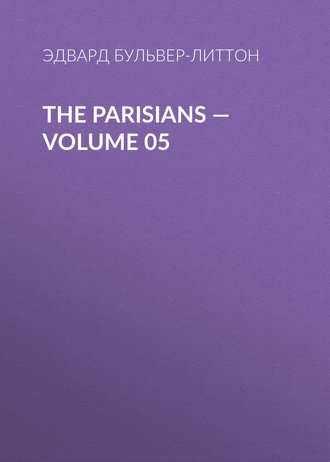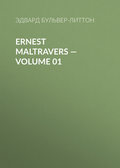
Эдвард Бульвер-Литтон
The Parisians — Volume 05
BOOK V
CHAPTER I
The next day at noon M. Louvier was closeted in his study with M. Gandrin.
"Yes," cried Louvier, "I have behaved very handsomely to the beau Marquis. No one can say to the contrary."
"True," answered Gandrin. "Besides the easy terms for the transfer of the mortgages, that free bonus of one thousand louis is a generous and noble act of munificence."
"Is it not! and my youngster has already begun to do with it as I meant and expected. He has taken a fine apartment; he has bought a coupe and horses; he has placed himself in the hands of the Chevalier de Finisterre; he is entered at the Jockey Club. Parbleu, the one thousand louis will be soon gone."
"And then?"
"And then! why, he will have tasted the sweets of Parisian life; he will think with disgust of the vieux manoir. He can borrow no more. I must remain sole mortgagee, and I shall behave as handsomely in buying his estates as I have behaved in increasing his income."
Here a clerk entered and said that a monsieur wished to see M. Louvier for a few minutes in private, on urgent business.
"Tell him to send in his card."
"He has declined to do so, but states that he has already the honour of your acquaintance."
"A writer in the press, perhaps; or is he an artist?"
"I have not seen him before, Monsieur, but he has the air tres comme il faut."
"Well, you may admit him. I will not detain you longer, my dear Gandrin.
My homages to Madame. Bonjour."
Louvier bowed out M. Gandrin, and then rubbed his hands complacently. He was in high spirits. "Aha, my dear Marquis, thou art in my trap now. Would it were thy father instead," he muttered chucklingly, and then took his stand on the hearth, with his back to the fireless grate. There entered a gentleman exceedingly well dressed,—dressed according to the fashion, but still as became one of ripe middle age, not desiring to pass for younger than he was.
He was tall, with a kind of lofty ease in his air and his movements; not slight of frame, but spare enough to disguise the strength and endurance which belong to sinews and thews of steel, freed from all superfluous flesh, broad across the shoulders, thin in the flanks. His dark hair had in youth been luxuriant in thickness and curl; it was now clipped short, and had become bare at the temples, but it still retained the lustre of its colour and the crispness of its ringlets. He wore neither beard nor mustache, and the darkness of his hair was contrasted by a clear fairness of complexion, healthful, though somewhat pale, and eyes of that rare gray tint which has in it no shade of blue,—peculiar eyes, which give a very distinct character to the face. The man must have been singularly handsome in youth; he was handsome still, though probably in his forty- seventh or forty-eighth year, doubtless a very different kind of comeliness. The form of the features and the contour of the face were those that suit the rounded beauty of the Greek outline, and such beauty would naturally have been the attribute of the countenance in earlier days; but the cheeks were now thin, and with lines of care and sorrow between nostril and lip, so that the shape of the face seemed lengthened, and the features had become more salient.
Louvier gazed at his visitor with a vague idea that he had seen him before, and could not remember where or when; but at all events he recognized at the first glance a man of rank and of the great world.
"Pray be seated, Monsieur," he said, resuming his own easy-chair.
The visitor obeyed the invitation with a very graceful bend of his head, drew his chair near to the financier's, stretched his limbs with the ease of a man making himself at home, and fixing his calm bright eyes quietly on Louvier, said, with a bland smile,—
"My dear old friend, do you not remember me? You are less altered than I am."
Louvier stared hard and long; his lip fell, his cheek paled, and at last he faltered out, "Ciel! is it possible! Victor, the Vicomte de Mauleon?"
"At your service, my dear Louvier."
There was a pause; the financier was evidently confused and embarrassed, and not less evidently the visit of the "dear old friend" was unwelcome.
"Vicomte," he said at last, "this is indeed a surprise; I thought you had long since quitted Paris for good."
"'L'homme propose,' etc. I have returned, and mean to enjoy the rest of my days in the metropolis of the Graces and the Pleasures. What though we are not so young as we were, Louvier,—we have more vigour in us than the new generation; and though it may no longer befit us to renew the gay carousals of old, life has still excitements as vivid for the social temperament and ambitious mind. Yes, the roi des viveurs returns to Paris for a more solid throne than he filled before."
"Are you serious?"
"As serious as the French gayety will permit one to be."
"Alas, Monsieur le Vicomte! can you flatter yourself that you will regain the society you have quitted, and the name you have—"
Louvier stopped short; something in the Vicomte's eye daunted him.
"The name I have laid aside for convenience of travel. Princes travel incognito, and so may a simple gentilhomme. 'Regain my place in society,' say you? Yes; it is not that which troubles me."
"What does?"
"The consideration whether on a very modest income I can be sufficiently esteemed for myself to render that society more pleasant than ever. Ah, mon cher! why recoil? why so frightened? Do you think I am going to ask you for money? Have I ever done so since we parted; and did I ever do so before without repaying you? Bah! you roturiers are worse than the Bourbons. You never learn or unlearn. 'Fors non mutat genus.'"
The magnificent millionaire, accustomed to the homage of grandees from the Faubourg and lions from the Chaussee d'Antin, rose to his feet in superb wrath, less at the taunting words than at the haughtiness of mien with which they were uttered.
"Monsieur, I cannot permit you to address me in that tone. Do you mean to insult me?"
"Certainly not. Tranquillize your nerves, reseat yourself, and listen,— reseat yourself, I say."
Louvier dropped into his chair.
"No," resumed the Vicomte, politely, "I do not come here to insult you, neither do I come to ask money; I assume that I am in my rights when I ask Monsieur Louvier what has become of Louise Duval?"
"Louise Duval! I know nothing about her."
"Possibly not now; but you did know her well enough, when we two parted, to be a candidate for her hand. You did know her enough to solicit my good offices in promotion of your suit; and you did, at my advice, quit Paris to seek her at Aix-la-Chapelle."
"What! have you, Monsieur de Mauleon, not heard news of her since that day?"
"I decline to accept your question as an answer to mine. You went to Aix-la-Chapelle; you saw Louise Duval, at my urgent request she condescended to accept your hand."
"No, Monsieur de Mauleon, she did not accept my hand. I did not even see her. The day before I arrived at Aix-la-Chapelle she had left it,—not alone,—left it with her lover."
"Her lover! You do not mean the miserable Englishman who—"
"No Englishman," interrupted Louvier, fiercely. "Enough that the step she took placed an eternal barrier between her and myself. I have never even sought to hear of her since that day. Vicomte, that woman was the one love of my life. I loved her, as you must have known, to folly, to madness. And how was my love requited? Ah! you open a very deep wound, Monsieur le Vicomte."
"Pardon me, Louvier; I did not give you credit for feelings so keen and so genuine, nor did I think myself thus easily affected by matters belonging to a past life so remote from the present. For whom did Louise forsake you?"
"It matters not; he is dead."
"I regret to hear that; I might have avenged you."
"I need no one to avenge my wrong. Let this pass."
"Not yet. Louise, you say, fled with a seducer? So proud as she was, I can scarcely believe it."
"Oh, it was not with a roturier she fled; her pride would not have allowed that."
"He must have deceived her somehow. Did she continue to live with him?"
"That question, at least, I can answer; for though I lost all trace of her life, his life was pretty well known to me till its end; and a very few months after she fled he was enchained to another. Let us talk of her no more."
"Ay, ay," muttered De Mauleon, "some disgraces are not to be redeemed, and therefore not to be discussed. To me, though a relation, Louise Duval was but little known, and after what you tell me, I cannot dispute your right to say, 'Talk of her no more.' You loved her, and she wronged you. My poor Louvier, pardon me if I made an old wound bleed afresh."
These words were said with a certain pathetic tenderness; they softened Louvier towards the speaker.
After a short pause the Vicomte swept his hand over his brow, as if to dismiss from his mind a painful and obtrusive thought; then with a changed expression of countenance,—an expression frank and winning,— with voice and with manner in which no vestige remained of the irony or the haughtiness with which he had resented the frigidity of his reception, he drew his chair still nearer to Louvier's, and resumed: "Our situations, Paul Louvier, are much changed since we two became friends. I then could say, 'Open sesame' to whatever recesses, forbidden to vulgar footsteps, the adventurer whom I took by the hand might wish to explore. In those days my heart was warm; I liked you, Louvier,—honestly liked you. I think our personal acquaintance commenced in some gay gathering of young viveurs, whose behaviour to you offended my sense of good breeding?"
Louvier coloured and muttered inaudibly. De Mauleon continued: "I felt it due to you to rebuke their incivilities, the more so as you evinced on that occasion your own superiority in sense and temper, permit me to add, with no lack of becoming spirit."
Louvier bowed his head, evidently gratified.
"From that day we became familiar. If any obligation to me were incurred, you would not have been slow to return it. On more than one occasion when I was rapidly wasting money—and money was plentiful with you—you generously offered me your purse. On more than one occasion I accepted the offer; and you would never have asked repayment if I had not insisted on repaying. I was no less grateful for your aid." Louvier made a movement as if to extend his hand, but he checked the impulse.
"There was another attraction which drew me towards you. I recognized in your character a certain power in sympathy with that power which I imagined lay dormant in myself, and not to be found among the freluquets and lions who were my more habitual associates. Do you not remember some hours of serious talk we have had together when we lounged in the Tuileries, or sipped our coffee in the garden of the Palais Royal?—hours when we forgot that those were the haunts of idlers, and thought of the stormy actions affecting the history of the world of which they had been the scene; hours when I confided to you, as I confided to no other man, the ambitious hopes for the future which my follies in the present, alas! were hourly tending to frustrate."
"Ay, I remember the starlit night; it was not in the gardens of the Tuileries nor in the Palais Royal,—it was on the Pont de la Concorde, on which we had paused, noting the starlight on the waters, that you said, pointing towards the walls of the Corps Legislatif, 'Paul, when I once get into the Chamber, how long will it take me to become First Minister of France?'"
"Did I say so?—possibly; but I was too young then for admission to the Chamber, and I fancied I had so many years yet to spare in idle loiterings at the Fountain of Youth. Pass over these circumstances. You became in love with Louise. I told you her troubled history; it did not diminish your love; and then I frankly favoured your suit. You set out for Aix-la-Chapelle a day or two afterwards; then fell the thunderbolt which shattered my existence, and we have never met again till this hour. You did not receive me kindly, Paul Louvier."
"But," said Louvier, falteringly, "but since you refer to that thunderbolt, you cannot but be aware that—that—"
"I was subjected to a calumny which I expect those who have known me as well as you did to assist me now to refute."
"If it be really a calumny."
"Heavens, man! could you ever doubt that?" cried De Mauleon, with heat; "ever doubt that I would rather have blown out my brains than allowed them even to conceive the idea of a crime so base?"
"Pardon me," answered Louvier, meekly, "but I did not return to Paris for months after you had disappeared. My mind was unsettled by the news that awaited me at Aix; I sought to distract it by travel,—visited Holland and England; and when I did return to Paris, all that I heard of your story was the darker side of it. I willingly listen to your own account. You never took, or at least never accepted, the Duchesse de ———'s jewels; and your friend M. de ——- never sold them to one jeweller and obtained their substitutes in paste from another?"
The Vicomte made a perceptible effort to repress an impulse of rage; then reseating himself in his chair, and with that slight shrug of the shoulder by which a Frenchman implies to himself that rage would be out of place, replied calmly, "M. de N. did as you say, but of course not employed by me, nor with my knowledge. Listen; the truth is this,—the time has come to tell it. Before you left Paris for Aix I found myself on the brink of ruin. I had glided towards it with my characteristic recklessness, with that scorn of money for itself, that sanguine confidence in the favour of fortune, which are vices common to every roi des viveurs. Poor mock Alexanders that we spendthrifts are in youth! we divide all we have among others, and when asked by some prudent friend, 'What have you left for your own share?' answer, 'Hope.' I knew, of course, that my patrimony was rapidly vanishing; but then my horses were matchless. I had enough to last me for years on their chance of winning—of course they would win. But you may recollect when we parted that I was troubled,—creditors' bills before me—usurers' bills too,— and you, my dear Louvier, pressed on me your purse, were angry when I refused it. How could I accept? All my chance of repayment was in the speed of a horse. I believed in that chance for myself; but for a trustful friend, no. Ask your own heart now,—nay, I will not say heart,—ask your own common-sense, whether a man who then put aside your purse—spendthrift, vaurien, though he might be—was likely to steal or accept a woman's jewels. Va, mon pauvre Louvier, again I say, 'Fors non mutat genus.'"
Despite the repetition of the displeasing patrician motto, such reminiscences of his visitor's motley character—irregular, turbulent, the reverse of severe, but, in its own loose way, grandly generous and grandly brave—struck both on the common-sense and the heart of the listener; and the Frenchman recognized the Frenchman. Louvier doubted De Mauleon's word no more, bowed his head, and said, "Victor de Mauleon, I have wronged you; go on."
"On the day after you left for Aix came that horse-race on which my all depended: it was lost. The loss absorbed the whole of my remaining fortune; it absorbed about twenty thousand francs in excess, a debt of honour to De N., whom you called my friend. Friend he was not; imitator, follower, flatterer, yes. Still I deemed him enough my friend to say to him, 'Give me a little time to pay the money; I must sell my stud, or write to my only living relation from whom I have expectations.' You remember that relation,—Jacques de Mauleon, old and unmarried. By De N.'s advice I did write to my kinsman. No answer came; but what did come were fresh bills from creditors. I then calmly calculated my assets. The sale of my stud and effects might suffice to pay every sou that I owed, including my debt to De N.; but that was not quite certain. At all events, when the debts were paid I should be beggared. Well, you know, Louvier, what we Frenchmen are: how Nature has denied to us the quality of patience; how involuntarily suicide presents itself to us when hope is lost; and suicide seemed to me here due to honour, namely, to the certain discharge of my liabilities,—for the stud and effects of Victor de Mauleon, roi des viveurs, would command much higher prices if he died like Cato than if he ran away from his fate like Pompey. Doubtless De N. guessed my intention from my words or my manner; but on the very day in which I had made all preparations for quitting the world from which sunshine had vanished, I received in a blank envelope bank-notes amounting to seventy thousand francs, and the post-mark on the envelope was that of the town of Fontainebleau, near to which lived my rich kinsman Jacques. I took it for granted that the sum came from him. Displeased as he might have been with my wild career, still I was his natural heir. The sum sufficed to pay my debt to De N., to all creditors, and leave a surplus. My sanguine spirits returned. I would sell my stud; I would retrench, reform, go to my kinsman as the penitent son. The fatted calf would be killed, and I should wear purple yet. You understand that, Louvier?"
"Yes, yes; so like you. Go on."
"Now, then, came the thunderbolt! Ah! in those sunny days you used to envy me for being so spoilt by women. The Duchesse de ——— had conceived for me one of those romantic fancies which women without children and with ample leisure for the waste of affection do sometimes conceive for very ordinary men younger than themselves, but in whom they imagine they discover sinners to reform or heroes to exalt. I had been honoured by some notes from the Duchesse in which this sort of romance was owned. I had not replied to them encouragingly. In truth, my heart was then devoted to another,—the English girl whom I had wooed as my wife; who, despite her parents' retraction of their consent to our union when they learned how dilapidated were my fortunes, pledged herself to remain faithful to me, and wait for better days." Again De Mauleon paused in suppressed emotion, and then went on hurriedly: "No, the Duchesse did not inspire me with guilty passion, but she did inspire me with an affectionate respect. I felt that she was by nature meant to be a great and noble creature, and was, nevertheless, at that moment wholly misled from her right place amongst women by an illusion of mere imagination about a man who happened then to be very much talked about, and perhaps resembled some Lothario in the novels which she was always reading. We lodged, as you may remember, in the same house."
"Yes, I remember. I remember how you once took me to a great ball given by the Duchesse; how handsome I thought her, though no longer young; and you say right—how I did envy you, that night!"
"From that night, however, the Duc, not unnaturally, became jealous. He reproved the Duchesse for her too amiable manner towards a mauvais sujet like myself, and forbade her in future to receive my visits. It was then that these notes became frequent and clandestine, brought to me by her maid, who took back my somewhat chilling replies.
"But to proceed. In the flush of my high spirits, and in the insolence of magnificent ease with which I paid De N——— the trifle I owed him, something he said made my heart stand still."
"I told him that the money received had come from Jacques de Mauleon, and that I was going down to his house that day to thank him. He replied, 'Don't go; it did not come from him.' 'It must; see the post-mark of the envelope,—Fontainebleau.' 'I posted it at Fontainebleau.' 'You sent me the money, you!' 'Nay, that is beyond my means. Where it came from,' said this miserable, 'much more may yet come;' and then be narrated, with that cynicism so in vogue at Paris, how he had told the Duchesse (who knew him as my intimate associate) of my stress of circumstance, of his fear that I meditated something desperate; how she gave him the jewels to sell and to substitute; how, in order to baffle my suspicion and frustrate my scruples, he had gone to Fontainebleau and there posted the envelope containing the bank-notes, out of which he secured for himself the payment he deemed otherwise imperilled. De N. having made this confession, hurried down the stairs swiftly enough to save himself a descent by the window. Do you believe me still?"
"Yes; you were always so hot-blooded, and De N. so considerate of self, I believe you implicitly."
"Of course I did what any man would do; I wrote a hasty letter to the Duchesse, stating all my gratitude for an act of pure friendship so noble; urging also the reasons that rendered it impossible for a man of honour to profit by such an act. Unhappily, what had been sent was paid away ere I knew the facts; but I could not bear the thought of life till my debt to her was acquitted; in short, Louvier, conceive for yourself the sort of letter which I—which any honest man—would write, under circumstances so cruel."
"H'm!" grunted Louvier.
"Something, however, in my letter, conjoined with what De N. had told her as to my state of mind, alarmed this poor woman, who had deigned to take in me an interest so little deserved. Her reply, very agitated and incoherent, was brought to me by her maid, who had taken my letter, and by whom, as I before said, our correspondence had been of late carried on. In her reply she implored me to decide, to reflect on nothing till I had seen her; stated how the rest of her day was pre-engaged; and since to visit her openly had been made impossible by the Due's interdict, enclosed the key to the private entrance to her rooms, by which I could gain an interview with her at ten o'clock that night, an hour at which the Duc had informed her he should be out till late at his club. Now, however great the indiscretion which the Duchesse here committed, it is due to her memory to say that I am convinced that her dominant idea was that I meditated self-destruction; that no time was to be lost to save me from it; and for the rest she trusted to the influence which a woman's tears and adjurations and reasonings have over even the strongest and hardest men. It is only one of those coxcombs in whom the world of fashion abounds who could have admitted a thought that would have done wrong to the impulsive, generous, imprudent eagerness of a woman to be in time to save from death by his own hand a fellow-being for whom she had conceived an interest. I so construed her note. At the hour she named I admitted myself into the rooms by the key she sent. You know the rest: I was discovered by the Duc and by the agents of police in the cabinet in which the Duchesse's jewels were kept. The key that admitted me into the cabinet was found in my possession."
De Mauleon's voice here faltered, and he covered his face with a convulsive hand. Almost in the same breath he recovered from visible sign of emotion, and went on with a half laugh.
"Ah! you envied me, did you, for being spoiled by the women? Enviable position indeed was mine that night! The Duc obeyed the first impulse of his wrath. He imagined that I had dishonoured him; he would dishonour me in return. Easier to his pride, too, a charge against the robber of jewels than against a favoured lover of his wife. But when I, obeying the first necessary obligation of honour, invented on the spur of the moment the story by which the Duchesse's reputation was cleared from suspicion, accused myself of a frantic passion and the trickery of a fabricated key, the Due's true nature of gentilhomme came back. He retracted the charge which he could scarcely even at the first blush have felt to be well-founded; and as the sole charge left was simply that which men comme il faut do not refer to criminal courts and police investigations, I was left to make my bow unmolested and retreat to my own rooms, awaiting there such communciations as the Duc might deem it right to convey to me on the morrow.
"But on the morrow the Duc, with his wife and personal suite, quitted Paris en route for Spain; the bulk of his retinue, including the offending Abigail, was discharged; and, whether through these servants or through the police, the story before evening was in the mouth of every gossip in club or cafe,—exaggerated, distorted, to my ignominy and shame. My detection in the cabinet, the sale of the jewels, the substitution of paste by De N., who was known to be my servile imitator and reputed to be my abject tool, all my losses on the turf, my debts,— all these scattered fibres of flax were twisted together in a rope that would have hanged a dog with a much better name than mine. If some disbelieved that I could be a thief, few of those who should have known me best held me guiltless of a baseness almost equal to that of theft,— the exaction of profit from the love of a foolish woman."
"But you could have told your own tale, shown the letters you had received from the Duchesse, and cleared away every stain on your honour."
"How?—shown her letters, ruined her character, even stated that she had caused her jewels to be sold for the uses of a young roue! Ah, no, Louvier! I would rather have gone to the galleys."
"H'm!" grunted Louvier again.







